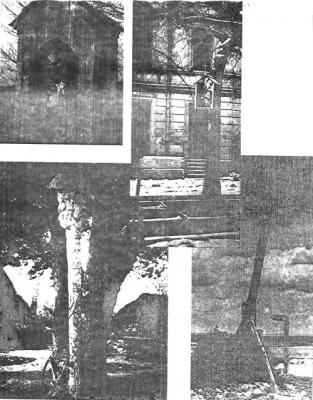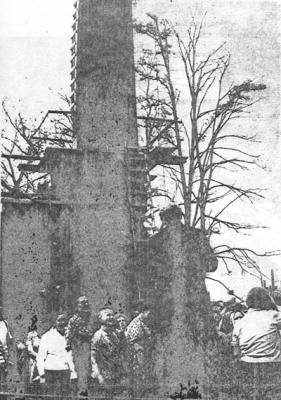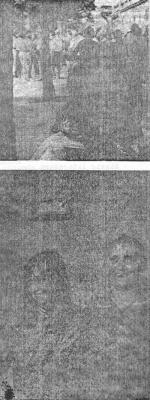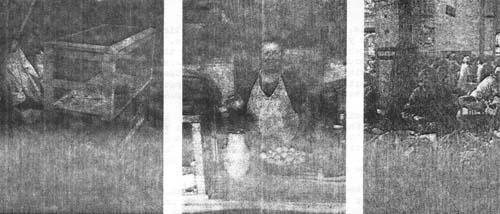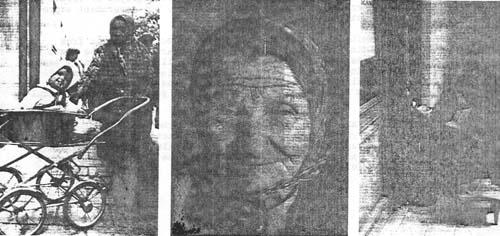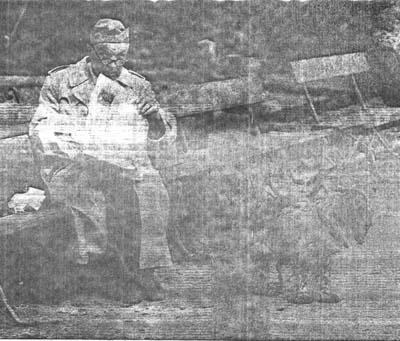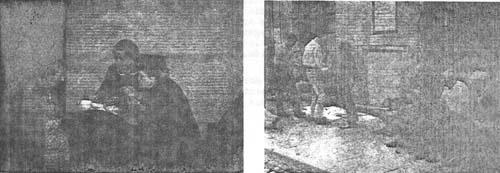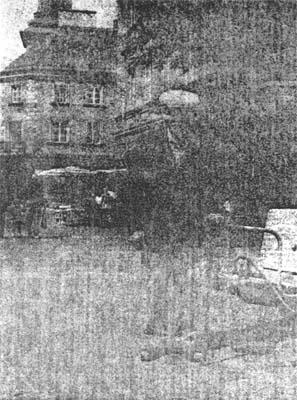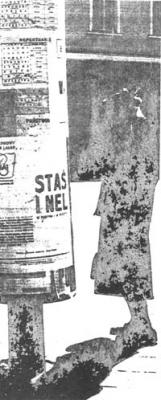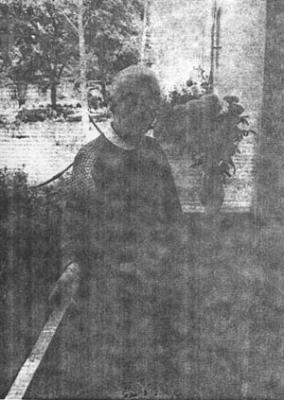The Aged In Poland: God and Worn-Out Babcias
By Nada Skerly
Warsaw, Poland
November, 1971
A peasant from Cracow kneels transfixed before the bejeweled altar portrait of the Black Madonna of Czestochowa. Her black-babushka-covered head is one of hundreds bowed toward the revered icon-purportedly painted by St. Luke and possessing miraculous powers.

Our Lady of Czestochowa
Scores of pilgrims stream to this Polish Lourdes daily in prayerful hopes of cures or consolations. Crouched near the farmwoman is an aged nun, a former princess, who annually walks the 138 miles from Warsaw. Here and there bob Polish-Americans, distinguishable by permanented grey curls and drip-dry clothing.
Over 100,000 persons converge on Ascension Day alone, jamming buses, trains and roadways. They represent all ages, men as well as women, from all walks of life. They come to baptize the newborn, remember the dead, and petition for the sickly. Their tributes form a bizarre mosaic on chapel walls: Thousands of scholastic, sports and military medals and occasional Communist Party decorations.
Suppliants cram into the church to stare entranced at the image for hours. It is as though one could will by osmosis the transference of magic qualities from the painted face to one’s own being. They remain until the dramatic closing ceremony at five p.m. Then, to the accompaniment of a tremulous drum roll and plaintive coronet solo, a heavy metal curtain slowly descends over the Madonna. Tear-stained faces turn away emotionally spent, but spiritually refreshed.
Our Lady of Czestochowa hangs in most Polish homes along with a crucifix and other holy pictures. Party members are not accepted, pressured by family and custom to tolerate if not honor the symbols. To avoid recriminations from more orthodox comrades, some of these families are said to sneak off for mass to parishes where they are unknown. And woe to the Party man who tries to dissuade his old mother from attending services!
Christianity is over 1000 years old here and the Poles are quick to add that it was their King John III who saved the rest of Europe from the Ottoman onslaught several centuries ago.


At every bend in the road, city or country, any time of the year, religious art reminds you this is Catholic Poland.
The predominantly peasant population (52 per cent) accepts the village proboszcz or chief priest as saintly and kisses his hand in homage. A family, rich or poor, still feels blessed if’ a son and daughter join a religious order and each year there are 3,000 noviates. There are already 20,000 priests (in a country of 33 million people).
The Communists have tried to break Church pre-eminence by refusing to permit reconstruction of all war-devastated churches or the building of new ones. But their hand was forced in Nowa Huta, a satellite iron and steel city of 100,000 outside Cracow. The workers, mostly from the very religious south of Poland wanted a church. About 100 of them died in a 1960 demonstration for it.
“The government has the power, but we have the people,” explains a priest.
Masterminding a million dollar cathedral there now is globetrotting Father Jozef Gorzelany. He is collecting funds from émigré Poles.
Why did the government assent? It is described as one of those paradoxes of Polish life called combinuje. Of making deals and having the right contacts. Fortuitously, Gorzelany and Josef Cyrankiewicz, the President of Poland are old friends. They were both incarcerated at Auschwitz.
Priests are allowed to roam freely and their black, full skirted, maxi cassocks are familiar city sights. “They are masters at public relations,” says one observer, “and enjoy a credibility the government wishes it had.” A standard response from many individuals is, “Go ask a priest. He will tell you the truth.”
Religion to the Pole is as essential as the air he breathes. It is an inextricable part of his living pattern, traditions and customs. He is a Catholic first, a Pole second.

Father Gorzelany at church site.
Ask great-grandmother Zofia Gorbielonka what is important in her life and she turns her honest, kindly blue eyes skyward and replies, “God.” Thinking she has misunderstood the question, I ask the translator to try again. Do her family or her health occupy her thoughts? The widow looks at me quizzically. “I am with God,” she repeats. “He takes care of everything.”
For spunky octogenerian Zofia, he seems to. Thrice weekly, she treks 20 miles into central Cracow, partly by bus, carrying 22 pounds of sausage in a white sling over her back. The famous, smoked, garlicky product of Przeginia fetches a good price in the city. Her earnings are only four dollars a week. She makes the rounds of restaurateurs, pausing enroute to pray in one of 80 churches. She knows them all well.
“It is more interesting than just walking three miles to my own village church,” she says of her job. Proudly, she adds she has been to Czestochowa four times.
Tending the farm now is a daughter, one of four surviving children. Eight others died- under the inheritance law of Dozywocie, which means life care, she is obliged to provide for her parent.
Blackened-log houses with straw-thatched roofs and barns dot the farm landscape. Marked roads are few and the taxi bounces and jolts across grassy fields.
Two cows share the three-room cottage. Theirs is adjacent to the kitchen-bedroom. My priest-guide, the chauffeur and I are ushered into a second bedroom cum salon. A large bed and two wardrobes fill most of the space so we sit at the tray-sized company table near the doorway.
As promised when we met on the Cracow main square, Zofia brings out an 11 a.m. snack of sausages and sugared vodka. Father Kazimierz is a teetotaler, the driver has no choice, and it’s up to me to satisfy drink honors. I understand a little Polish because of my Slovene background and after several toasts of nasdravje (to your health), it got better.

Top, Zofia; right, babcia Aniela and granddaughter Miroslawa.
The ladies laugh a lot upon discovering that the priest, camouflaged in a black nylon windbreaker and slacks, is not my husband. Upon departure, Zofia presses a packet of sausages into my arms, blesses me and extracts a promise to come again.
For her, life continues in an uncomplicated pattern as it did for her ancestors. She has little income (peasants are excluded from pension systems), but some measure of security, both financial and emotional, with her progeny.
Many others are less fortunate. They have been left behind in the mass exodus to cities and industrial jobs, a 20 per cent population shift since the war. Cities are meccas for the young; villages, ghettos occupied by 77 per cent of the old.
Offspring who have tasted urban life and higher education are loath to return to the farm and responsibilities toward the elderly. According to Jerzy Piotrowski, Warsaw gerontologist and member of a government planning board, 300,000 farms (10 per cent of the total) are without heirs.
The aged peasant is in a quandary. Land has been his status for centuries and he hesitates to sign it over to a disinterested son. Or, to the government. He can cede the land to the latter in exchange for a small lifetime pension. But this unique social security trade-off has had few takers.
When children make a place in city apartments for their parents, it is primarily for the babcia or grandmother, rarely for the grandfather. Slavic literature abounds with tales of the wise, kind and honored older woman (babka in Russian), who gave esprit to the household. The contemporary sequel shows her exploited as an economic necessity.
Elsewhere in Eastern Europe, as well, she has become an overworked, unpaid babysitter and household drudge who maintains the home so both parents can work. It is not a joke that a girl’s best dowry is her mother and an apartment. Both are scarce.
The myth of the babcia and happy multi-generational coexistence is shattered in a 1970 Polish government reported titled “Old People in Poland.” In it, Prof. Piotrowski notes that 67 per cent of the elderly live with their children (cf. 28 per cent in the U.S.), out of necessity rather than love. The majority are squeezed into one to two room flats. Given a preference, 80 per cent would prefer to live alone. They agree, “Children take care of their parents only as long as they can benefit from it in some way.”
Lack of pension and the housing shortage, the reports adds, “makes one dependent on the family…and forces the continuation of employment… either to take care of the children or help in running the household.”
Aniela Sroka, 66, has shared a one room flat with her daughter Albina and policeman son-in-law since the birth of Miroslawa 13 years ago.
Life has never been easy. A landless peasant, she was widowed 35 years ago with six small children to raise.
Albina’s eyes grow moist as she tells of her mother’s sacrifices. She wishes it could be more pleasant for her now. But she needs her to keep house or would be forced to quit a garment factory job in Nowa Huta. Besides, she adds, where would mother go?
Mrs. Sroka sits self-consciously at one corner of a small table, which is freshly laid-out with starched white damask for afternoon coffee and cake. Her brown-and-grey-flecked hair is tightly pulled back into a braided bun at the nape of her neck. Scrubbed pink cheeks open in a smile to reveal several stainless steel teeth. She sleeps in the kitchen nook. The other three bed down in this room, equivalent in size to some U.S. bathrooms.
Waiting time for a larger apartment is four years. When asked about the cramped quarters, Mrs. Sroka breaks into tears. So one quickly changes the subject to news of a son immigrated to Canada.
A Polish psychologist describes such living conditions as “living in rat cages.” Fortunately, with this family, there is an aura of mutual affection and caring. Also, of sharing. The babcia, wearing her navy, polka dot Sunday best, participates in the visit. Among some more professional families, she might have been sent out to sit in the park and spare the hosts embarrassment. Yes, it happens here, too.
One also finds upper class babcias who choose to live with their children, but are comfortable and independent. In the spacious Wroclaw villa of an internationally known physicist, the widowed mother has her own room and life style. With the aid of a servant, she raised her grandson so the mother could teach. She, herself, is a retired teacher and spends the 40-dollar monthly pension on tea with friends or seaside holidays. There are no pressures; only pleasures. Once a year, she retreats to a convent for two weeks as is the fashion among her peers.
Many envy the independent shop owners because they can afford luxurious trips abroad with their earnings and also save for retirement.
In a class by themselves are 3500 Polish Americans who have retired to Poland and live handsomely on U.S. Social Security benefits. With the generous bank exchange rate and dollar-shop privileges, they are the richest persons in their villages. In Chicago, 100 dollars barely pays the rent; in Ciechocinek, it’s more than a professor or factory director gets.
Of course, in the worker society, the professional enjoys other side-benefits, and young or old, is the privileged elite. Academicians, for example, may work until 70 (of male laborers to 65; female, 60). There are international study and travel advantages and retirement pay is 100 per cent of the basic wage. It corresponds to 300 to 400 dollars a month.
On the other hand, writers and artists, along with peasants, collect neither pensions nor extensive health benefits. Officially, that is. In a pinch, the ministry of culture will foot a hospital bill or approve a renta zasluzonych or merit pension.
Spinster Maria Traczewska, 66, finally got one. She is secretary of the exclusive Literary Club of Cracow and shares an unheated room in club headquarters with an ill sister. To supplement the small dole, she translates contemporary French, Russian, German and English authors.
Her own story is fascinating. She was the daughter of a Polish noble and educated by European tutors on the family Dneiper River estate in the Ukraine. The genteel life ended abruptly when Bolsheviks murdered her father and the children escaped to Warsaw. From the age of 14, she supported herself by giving French lessons and eventually earned a teaching degree in history of art.
Maria’s hardships are etched on her thin, crease-worn face if she stops smiling for a moment. But those pauses are rare. She is a model of positive thinking and insists, “I’ve been very lucky. I had a strict upbringing and was educated as a boy despite a tendency toward being frail and sickly. I thank my father for that.”
As tobacco-stained fingers light yet another strong, black cigarette, she adds quietly, “I believe in God. I am never alone. That has pulled me through.”
Maria dotes on conversation and books and what she shyly describes as “family:” Two small poodles.

Writers Maria Traczewska and Bronislav Heyduk.
Bronislav Heyduk, 61, another club member, paints and also writes 17th century historical novels. While other families are jammed into one-room apartments, he, a wife and teenage Bon have a two-bedroom dwelling in an elegant section of Cracow. Next door is another flat for his exclusive use as den-studio.
Heyduk boasts about his “artistic freedom,” and for his stories about kings and queens commands an advance of 120 dollars per chapter. With eight books published and another underway, he says he wouldn’t dream of trading in the successful writing formula for a pension. He is entitled to one as a former art academy instructor. Perhaps his books are better than the tasteless oils which decorate the walls. Or maybe he has official connections.
The Party, with an estimated membership of six million, is known to take care of its own. Defenders of the state – the military and the secret police – may retire early at full salary and enter second careers. As laborers, they also get preferred treatment.
Jan Lisowski, of Katowice, knows about that. As had his family for generations, he worked underground in the hard coal mines of Upper Silesia. Katowice is another Pittsburgh before its face-lift: Drab buildings veiled by smog and everything coated with thin layers of black soot.
Because of the difficult work, miners are retired at 55, but Lisowski, 65, worked five years longer. “If someone were ever to see how hard we work,” he says, “he would never go under. Mining is the worst job in the world. All my co-workers died eight years ago.” Except for a chronic cough, he is well. But his skin looks tattooed slate grey from the coal dust. “I am glad I am emeritov (retired),” he adds. “I would never go back. The family tradition is finally broken. I have only daughters.”
Lisowski laughs and jokes a good deal and is not bitter about the past. But he is about the Party. “They would bring in a new crop of miners who would excitedly ask if we really earned 120 dollars a month. We would laugh and tell them to wait until payday. You know what they got as beginners? Six dollars a week.”
His own earnings totaled 88 dollars a month; the pension is a shade less. “Party members,” he adds, earn 120 to 200 dollars a month for doing the same job.”
“Earlier,” he continues, “we had free vacation houses. Now you must pay and get reimbursed only if you are sick. Or you can go in the winter when it snows,” he says with a caustic laugh.
As in the U.S., good health care has its price. A private physician here charges 8 dollars for an office visit and 20 for a house call. Specialists get 20 dollars for office treatment alone. Private home nursing, around the clock, costs 18 dollars a day.
Another myth of worker welfare is the Rada Seniorow, which the trade union says enables pensioners to “continue contact with state enterprises and not feel cut off.” They are reportedly brought in as consultants. Lisowski confirms what other individuals say, “It could never come in question.”
He adds, “You know what’ s available for the aged in this country? The cemetery. Then the miners’ orchestra plays at the burial. But not if it takes place before noon. That would mean paying them a shift.”
He shakes his head, but remains undaunted. “I take life as it comes,” he says. “I get up early and pray and can still work. I earn some money tending a school garden and furnace. I can still get about and have my glass of cognac, some food and go to sleep again. My free time I spend in church. That uplifts me.”
As we part, he kisses my hand. It is a gesture bestowed by all Polish gentlemen, miners and professors alike.
Katowice is another place where the people spearheaded a drive to complete the cathedral. As though acknowledging a miracle, a priest says, “The building blocks are the property of the state and officially off limits to us. But we get them.”
The city also has well-stocked food shops and the best-smoked ham in the country. “They have to provide it for the workers,” says a resident. Elsewhere, as in the seaport city of Gdansk, a shortage of meat and coffee and 30 per cent price rise just before Christmas sparked the so-called December riots last year.
Poland is eighth in world meat production, but much of it is exported to the USSR, its major trading partner. Now, to soften public discontent, the new regime has banners in city squares proclaiming “more pension benefits, medical care, housing and food.”
The food question is a sticky one. A skilled worker spends 85 per cent of his 120 dollar a month wage to feed a family of four. In one butcher shop, I found only two trays of bony stew meat. One was marked pork, the other, beef, and the price was two dollars a pound.
The lone, elderly city dweller, gets caught in the price and food squeeze. I saw some eating in the Warsaw University cafeteria on Nowy Siwat Street. The basic diet is cold or hot beet soup or dumplings with cottage cheese or fried pork rind. What looked like breaded veal outlets, turned out to be slabs of mashed potatoes, coated with crumbs and deep-fried.
To exist, or to supplement small allowances, many aged persons are forced to find jobs. Piotorsky’s report shows they work longer than their counterparts in the west.


In Poland, there are no handouts for the unproductive, not even if aged. One works at any job. Above, selling obwarzanki or hot pretzels; or farm products at the Wroclaw market. Below, a great-grandmother still baby-sits; an aged Mona Lisa cleans government offices; and one old-timer has a shoe-polish concession at the Hotel Bristol, Warsaw.
For example, Grzegorz Szezepanskir7O, retired from the Wielickzka salt mines last year after 44 years of service. But he cannot live on the 60-dollar pension and he is back carrying the miner’s lamp. This time, he is a tourist guide, earning two dollars a day for eight hours of arduous walking and talking. Nonetheless Szezepanski feels lucky to have the position and with much zest elaborates on the 900 year-old rock salt sculptures and 17th century underground chapels.
Call it resilience or indomitable spirit, the Poles have it. Their standard of living, they say, has decreased in the last dozen years, yet the man in the street is ebullient, warm hearted and optimistic. Whatever his problems, the world sees a happy face and the hospitality is incomparable. After a chance meeting in a shop or on a corner, he insists you come home for a meal.
These are the people who survived Nazi annihilation. The monster plan claimed six million Poles, including the cream of intellectuals, and flattened four-fifths of the cities. Stone by stone, Warsaw has been rebuilt and a citizen’s group is collecting funds to resurrect the royal castle as “a new great symbol of national unity.” (Significantly, the royal white eagle and not the Party boss decorates shop walls.)
“How do we survive in the face of continuous adversities?” asks a courtly aristocrat. “Darwin said adapt or perish. That’s your answer.”
The gentleman, a retired military man of 80, invited me for tea. He shares a three-room, old-fashioned flat in central Warsaw with an elderly sister. It is a page out of the 1920s: A clutter of French impressionist paintings, portraits of family members in flapper clothes, a leopard skin from an African shoot, the bust of an archbishop, priceless icons and silver tureens, and a faded coat of arms.
“What a pity you can’t stay longer to really see Poland,” says Captain Biguslaw. He opens a yellowed book to photographs of former family estates scattered throughout the country. The government expropriated all country and city properties.
Sister Amelia gets a small income for collecting rentals from apartment buildings they once owned. Receipts are used by the state for renovations. The captain supplements a small military pension by teaching French and English. He carefully adjusts his old, wire frame bifocals and proudly fishes a cherished letter from the writing table “Dear Master,” a student wrote. “Thank you for your patience and indulgence.”
Dusk falls and under the window one hears the romantic clip-clop of horse carts carrying farmers home from city markets. Miss Amelia serves tea in Meissen cups, wild strawberries from a silver salver and Viennese-type chocolate wafers. The old couple talks lose of the past and more of God and the future.
The captain shows me a small Photo of a young cousin in concentration camp pajamas and cap just before the execution. Some of his paintings and sculptures in the apartment are the only remembrances left. Captain Biguslaw sighs for a moment and recollects that his wife and other family members are gone as is the extravagant era in which they all once lived. Then he says brightly, “One must live for the development of Poland.”
Development hinges, however, on the young, not the old. The middle generation was obliterated by the war.
State planning is youth oriented, partly because of the post-war baby boom. In that period, Poland had the highest birthrate in Europe. As a result, says Piotrowski, there is a surplus of 1.5 million youth in the 20 to 22 year age group. They must be accommodated in the universities and on assembly lines, which means old-timers are pushed out of jobs sooner. But early retirement also costs money.
“Planning for the aged falls on deaf ears,” says Krystyna Mroczek, editor of an aged column for the Catholic daily Slowo Powszechne. “That is an expenditure toward non-productive purposes.”
Preventative care also reaps no returns.
Urszula Chlodzik, director of State Home for Pensioners No. 5, located 18 miles outside Warsaw, says, “There should be studio-size retirement apartments set up in large housing projects. The old are so lonely and isolated in these institutions.”
The state built homes for the elderly, but only the ambulatory have access and there are long waiting lists. As in other parts of Europe, including Scandinavia, there are geriatric hospitals rather than U.S. style nursing homes.
The Polish institutions are for the lone or abandoned old, for worn out and unwanted babcias. No. 5, like No. 3, which I also visited, is clean, well run, offers wholesome and tasty food, and minute doses of tender, loving care. But an institution is not a home.
“It is a substitute,” says Mrs. Chlodzik, a gregarious redhead who chain smokes Carmen filter cigarettes. She is frustrated by the problems. “An institution is like an artificial leg,” she explains. “It is helpful, but after some time, it gives trouble. For six months, the residents seem happy and tend their vegetable gardens, read and work at embroidery. Then the sickness of loneliness begins. They may be surrounded by 100 other old individuals, but they miss family life.”
In Poland, the amputation is more acute because family ties are so strong. Slavic emotion and sentimentality are woven into the fabric of daily life and the many religious and family celebrations.






Scenes from daily life in Poland.
The sociable Pole is also accustomed to an active public life. Cafes and theatres are crowded with people of all ages who chat and coquette and smile at each other. A government guide says she visited the U.S. recently and could have stayed, but was homesick for the life style in Warsaw. And how she missed Christmas at home!
Mrs. Chlodzik says they observe holiday practices, like the oplatek wafer sharing at Christmas and eating of doughnuts on “Fat Thursday” before Easter. “But it is not the same.
“They call me corumia (small daughter) because I try to share some affection with each. They need it so badly. ‘Oh, she smiled at me’, one of them will say if I find time to chat a bit.”
The weekly Warsaw Courier described the pathos as “The bitter taste of old age.” Because of the war, women outnumber men almost two to one. About half of them are spinsters.
“Thank God I don’t have children,” says one of them in the article. “Those around me who do have been cast off by their sons and daughters and those they loved. They are alone now. We are in impersonal golden cages. It is a solution for those whom life has made invalids.”
A former clerk, 76, was deserted by a wife now living in London, and a son in Australia. “Maybe some day she’ll come back to me,” he sobs as I meet him in the home’s reading room.
Wanda Wernik, 80, lost a husband and two daughters in the war. Until 13 years ago, she taught kindergarten. As we talk, she fondles a photo souvenir of the last class. “My children,” she says.

Wanda Wernik;

The Regulskos with his sketch of Frederick Chopin.
Mrs. Wernik has heart trouble and a lame toot, out a reserve or high spirits. “Do you want to see my room?” she asks. “It’s No. 13. Are you superstitious?”
She doesn’t mind living in the home, because “peace is the most important thing in life now.” And, she adds, letters from childhood friends. She has no other wishes.
Birch trees rustle outside her balcony and she adds an afterthought: Youth. “Who wouldn’t like to be young,” she says. “In spite of the difficulties and the war. I don’t want to die. I love to sing and have company. My birthday is next week. Isn’t that a nice age?”
The director taxes me on a tour of the grounds, including a summerhouse where residents display handicrafts. Well-executed charcoal sketches catch my eye. “Ah, yes,” sighs Mrs. Chlodzik. “That’s Prof. Regulsko. He used to teach philosophy at the university and now lives here with his wife. Both of their sons have good jobs and apartments, but there’s no room for their parents. The daughter-in-laws are against it. It’s a shame. They’re such a nice couple. But they won’t complain about their children. They boast about them and create a myth of how good they are.”
The Regulskos had just awakened from an afternoon nap when we stopped by their cozy room. When I ask about his art, Prof. Regulsko, 80, silently brings out piles of portraits, still lifes and charming illustrations of The Ant’s Wedding, a fairytale.
Mrs. Regulsko, a gentle-faced and still beautiful woman at 78, does the talking. She had been a gymnast in her youth and shows photos of herself in a white lace dress and picture hat. “The album is all we have left from the war,” she says. “We were bombed out.” The page falls open to handsome young men of university age. “Those are our sons,” she says in an even voice. “I think all day of their successes and problems. I love my daughter-in-law who is also my friend.”
There is something forlorn about this couple. They have family, yet they have no one but each other. In two years, they will celebrate their golden wedding. Will anyone remember them?
It is not the government’s problem. The aged polled by Piotrowski say it’s a family matter. Nonetheless the state has set up some day centers where retirees can get a hot noon meal and work at hobbies. One of six in Warsaw is housed in a modern, two story building near a housing complex. Dom Dziennego Pobytu Rencistow No. 5 has a director in a white hospital coat and 40 members. On this particular afternoon, only two are present. A widow, whose only son is in Australia, plays the piano; another sits reading with the aid of a magnifying glass.
They, too, are alone.
At the Crockodyl nightclub in Warsaw’s Old Town Square, young girls in hot pants do a boogie-woogie version of the Shake and other popular western dance steps. A Polish carbon copy of singer Tom Jones screams into a microphone, while couples at the tables snuggle, and sip Russian champagne (the cheapest drink in the house at two dollars a bottle). The place is loud, crowded, smoke-filled and airless – as it should be if one is to feel contemporary.
One person, a university professor in his thirties, ignores the cacophony and confusion. He wants to talk about his aspirations and hear about life in the U.S. Is there really that much crime and antiwar sentiment? What’s it like to be in a country where one is free to choose the course of study and the career?
He talks candidly about politics and social problems. Of the high alcoholism rate and proliferation of drinking and dining spots because there is nothing else to spend money on. They are also an escape from crowded housing situations, he adds.
Do I like Poland? Why am I here? Ah, yes the aged, he says. “The quality of age depends upon the attitude of one’s children. The babcia, for one, is out when her role is finished. Unfortunately, youth ignores age. It doesn’t even think of it.”

Received in New York on November 29, 1971
©1971 Nada Skerly
Nada Skerly is an Alicia Patterson Fund award winner on leave from The Cincinnati Post and Times-Star. This article may be published with credit to Miss Skerly, The Cincinnati Post and Times-Star, and The Alicia Patterson Fund.


